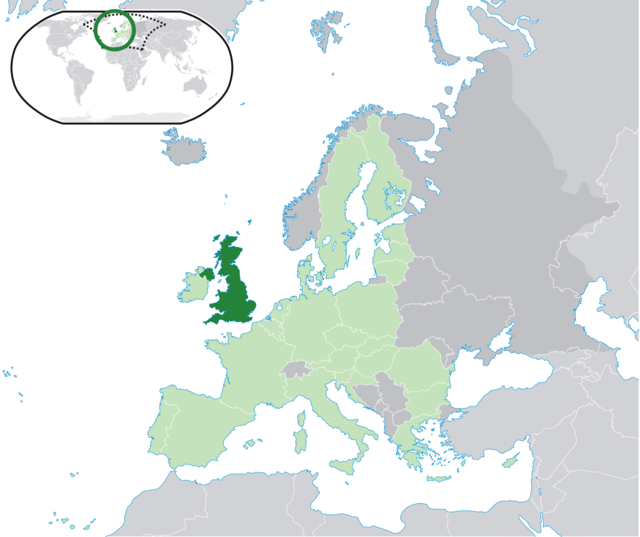Britania atawa Karajaan Ngahiji (United Kingdom) nyaéta karajaan di Éropa nu mangrupa gabungan Britania Raya jeung Irlandia Kalér.
|
|
Artikel ieu keur dikeureuyeuh, ditarjamahkeun tina basa Inggris. Bantuanna didagoan pikeun narjamahkeun. |
| United Kingdom of Great Britain and Northern Ireland Karajaan Ngahiji Britania Raya jeung Irlandia Kalér |
||||||
|---|---|---|---|---|---|---|
|
||||||
| Motto "Dieu et mon droit" (French) "God and my right" |
||||||
| Lagu "God Save the King" |
||||||
 Lokasi the Karajaan Ngahiji (dark green) – di buana Eropa (light green & dark grey) |
||||||
| Ibu kota (jeung kota panggedéna) | London | |||||
| Basa resmi | Basa Inggris (de facto) | |||||
| Basa régional | Irish Gaelic, Ulster Scots, Scots, Scottish Gaelic, Welsh, Cornish | |||||
| Démonim | British, Briton | |||||
| Pamaréntah | Constitutional monarchy (Parliamentary democracy) | |||||
| - | Raja | Charles III | ||||
| - | Perdana Menteri | Sir Keir Starmer | ||||
| Formation | ||||||
| - | Acts of Union | 1 Méi, 1707 | ||||
| - | Act of Union | 1 Januari, 1801 | ||||
| - | Anglo-Irish Treaty | 12 April, 1922 | ||||
| Asup ka Uni Éropa |
1 Januari, 1973 | |||||
| Aréa | ||||||
| - | Total | 244,820 km² (ka-79) 94,526 mil² |
||||
| - | Cai (%) | 1.34 | ||||
| Populasi | ||||||
| - | Perkiraan mid-2006 | 60,587,300[1] (ka-22) | ||||
| - | Sénsus 2001 | 58,789,194 | ||||
| - | Kapadetan | 246 /km² (ka-48) 637 /mil² |
||||
| GDP (PPP) | Perkiraan 2006 | |||||
| - | Total | $2.375 triliun (ka-5) | ||||
| - | Per kapita | $35,051 (ka-11) | ||||
| GDP (nominal) | Perkiraan 2007 | |||||
| - | Total | $2.660.7 triliun (ka-5) | ||||
| - | Per kapita | $38,624 (ka-13) | ||||
| Gini? (1999) | 36.8 (sedeng) | |||||
| HDI (2006) | ||||||
| Mata uang | Pound sterling (£) (GBP) |
|||||
| Zona wanci | GMT (UTC+0) | |||||
| - | Usum panas (DST) | BST (UTC+1) | ||||
| TLD Internét | .uk | |||||
| Kode telepon | +44 | |||||
| ^ In the United Kingdom and Dependencies, some other languages have been officially recognised as legitimate autochthonous (regional) languages under the European Charter for Regional or Minority Languages. In each of these, the UK's official name is as follows: Citakan:Lang-kw; Citakan:Lang-ga; Citakan:Lang-sco; Citakan:Lang-gd; Citakan:Lang-cy. ^ This is the royal motto. In Scotland, the royal motto is the Latin phrase Nemo Me Impune Lacessit ("No-one provokes me with impunity"). There is also a variant form of the coat-of-arms for use in Scotland; see Royal coat of arms of the United Kingdom. ^ See #Symbols below. It also serves as the Royal anthem. ^ English is established by de facto usage. In Wales, the Bwrdd yr Iaith Gymraeg is tasked with ensuring that, "in the conduct of public business and the administration of justice, the English and Welsh languages should be treated on a basis of equality".[2][3] The Bòrd na Gàidhlig is tasked with "securing the status of the Gaelic language as an official language of Scotland commanding equal respect to the English language".[4] ^ Under the European Charter for Regional or Minority Languages the Welsh, Scottish Gaelic, Cornish, Irish, Ulster Scots and Scots languages are officially recognised as Regional or Minority languages by the UK Government.[5] See also Languages in the United Kingdom. ^ CIA Factbook. Official estimate provided by the UK Office for National Statistics.[6] ^ ISO 3166-1 alpha-2 is GB, but .gb is practically unused. The .eu domain is also shared with other European Union member states. |
||||||
Catetan
Wikiwand in your browser!
Seamless Wikipedia browsing. On steroids.
Every time you click a link to Wikipedia, Wiktionary or Wikiquote in your browser's search results, it will show the modern Wikiwand interface.
Wikiwand extension is a five stars, simple, with minimum permission required to keep your browsing private, safe and transparent.


